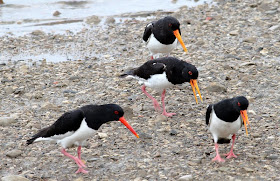Maybe I should have stayed in bed this morning rather than driving up to Conder Green. It wasn’t raining when I set off but I was barely through Cockerham when the rain started.
As I drove through Pilling village I bore down upon what from a distance away I took to be a corvid in the middle of the road. Only too late as I got up to the bird did I realise it was a Sparrowhawk with prey, and as I slammed on the anchors and reached for my camera on the passenger seat, the bird flew off carrying what was left of a small passerine. I really need a couple of pictures of a Sparrowhawk not in the hand, but they are not easy to get. One shot through the garden last night and hid in a neighbour's sycamore. Then later in the day I disturbed another when I went to ring some Swallows but it shot out of sight very quickly. Boy those Sparrowhawks don’t sit about in the open much.
It rained and gusted all the time I was at Conder Green and limited my brief birding. I got a good count of Common Sandpiper, with a minimum of 18 birds but took a shot of one I noticed with two colour rings, yellow and red, and a standard BTO metal ring on the other leg. Later I reported it online through “Euring”. But I don’t think I will win any prizes with the photograph taken in a downpour.

Other waders in the creek comprised a Little Egret and one each of Spotted Redshank, Greenshank, with 130 Redshank, 2 Bar-tailed Godwit, 1 Black-tailed Godwit and 7 Dunlin, with red and black being the dominant colours of these almost full adult plumage birds.

The sleek, black Oystercatchers with their thick carrot bills went through again with their noisy, elaborate, displays and territorial disputes around the pool, so I snatched a few pictures before the rains came again and I headed home.



Later I checked out a Swallow nest and ringed 5 young but all in all my Swallows aren’t having a good year, and whilst a brood of five I ringed about 10 days ago are ready to fly, they are minus one that fell victim to the Border Terriers in the dog pen below the nest.



OH but your Sparrowhawks are glorious images~
ReplyDeleteSuper sparrowhawk photos and really like that bar-tailed Godwit.
ReplyDeleteThat Sparrowhawk is cool! Nice! Love the oystercatchers too...a favorite of mine :)
ReplyDeleteYes, not easy to photographed that bird of prey, but you got great close-up there.
ReplyDeleteNice black Oystercatchers behaviour shots. I guess that one bright red bill is a male.
Great set Phil, you did well with the Sparrowhawk and I love the Godwit shot.
ReplyDeleteHahaha the oystercatchers' bills really look like carrots!
ReplyDeleteInteresting to see that some are reddish, while some are yellowish.
Thanks for your comments everyone. I think the colour intensity of the Oystercatcher bill deepens with age = older bird darker, younger bird lighter shade, but also I guess it reaches a limit. Some areas for a study there?
ReplyDeleteUnbelievable shots of the Sparrowhawk Phil! The Bar-tailed Godwit takes the prize for me though. Gorgeous color and detail.
ReplyDeleteBeautiful shots Phil! The Sparrowhawk photos are sensational! My favorite though(and I really love raptors) is the Bar-tailed Godwit. Incredible colors and detail. The Swallows are really cute too.
ReplyDeleteI agree, Phil - photography in the rain is an exercise in frustration. But perhaps it's reassuring that our eyes see much better than our cameras do. All in all, a good set of photos, especially the oystercatchers and the sparrowhawk.
ReplyDeletewow, that eye of the sparrowhawk, superb picture!
ReplyDeleteOf course the Sparrowhawk photos are fantastic. However, the Godwit photo had me going back to my books to check the ones we have out here. From what I have read I think that you have the nominate race Limosa lapponica whereas we get the two sub-species baueri and menzbieri. Baueri is the one we see here on the east coast of Australia and menzbieri is found in West Australia.
ReplyDeleteWOW, that's some eye on that Sparrowhawk! Excellent photo series Phil!
ReplyDeletelove the close up shot of the Sparrow Hawk
ReplyDeleteWhat marvelous close up shot of the sparrow hawk! and the young swallow look so adorable...
ReplyDelete